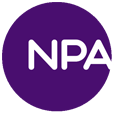Non-Partisan Association
Non-Partisan Association | |
|---|---|
| Active municipal party | |
 | |
| Leader | Kirk LaPointe |
| Founded | 1937 |
| Ideology | Conservatism |
| Political position | Centre-right |
| Colours | Purple |
| Seats on City Council |
3 / 11 |
| Seats on Park Board |
4 / 7 |
| Seats on School Board |
4 / 9 |
| Website | |
|
www | |
The Non-Partisan Association (NPA) is a municipal political party in Vancouver, British Columbia, Canada. There are, and have also been in the past, Non-Partisan Association political parties in the nearby municipalities of Burnaby, Richmond and Surrey.
The NPA was established in 1937 to counteract the rise of the democratic socialist Co-operative Commonwealth Federation. The party is generally perceived as centre-right within the Vancouver political spectrum and historically drew its strongest support from the business community and "corporate downtown".[1]
Peter Ladner was the NPA's nominee for mayor in the 2008 Vancouver civic election on November 15, 2008, but lost to Gregor Robertson, the candidate for Vision Vancouver. The NPA's electoral platform suggested that an NPA government would focus on reducing crime, improving housing affordability, leveraging the 2010 Winter Olympics, protecting the environment, advancing the city's arts and culture sector, and working collaboratively with senior levels of government, community groups, and the private sector.[2] The campaign emphasized the importance of experience and fiscal prudence during an economically tumultuous time.
The party, led by Suzanne Anton as the NPA candidate for mayor, once again lost to Robertson and Vision Vancouver in the 2011 Vancouver civic election on November 19, 2011, but elected two members to the city council.
Philosophy
The NPA's name stems from the ideological position that civic governance should not be driven by partisan, or party, politics. The tenets of the NPA's original constitution still stand today:
- To strive to improve civic government in Vancouver.
- To support the election of the most suitable candidates for civic office.
- To oppose the introduction of party politics into the elected boards of the city.
Over the years, these basic themes have been expanded to include the following principles:
- Municipal levels of government should act for the benefit of the people and should allow every individual the freedom of worship, assembly, opportunity and initiative.
- Individuals have the right to enjoy the fruits of their labour, and to own private property, and individual enterprise is generally preferable to government intervention.
- Civic progress and stability can only be achieved by upholding the law, accepting social responsibilities, and accomplishing change by intelligent planning.
- Elected civic representatives should make decisions based on the viewpoint of many individuals and organizations, and not be under obligation to policies or platforms of political parties.
Early years

The NPA's first civic election effort was a failure because a member of the executive, Colonel Nelson Spencer, broke away and ran for mayor after the NPA chose George Miller as its candidate instead of Spencer. The result was the right wing vote was split, and socialist Lyle Telford was elected. Telford would only serve one term before Jack Cornett was elected in the 1940 election, beginning the NPAs longstanding dominance of Vancouver's City Hall.
Electoral results
The NPA has often enjoyed electoral success during its history. It has held a majority on Vancouver City Council during many periods since 1941. Its majority on council has been interrupted during periods such as: 1967–70, 1972–78, 1982–86, 2002–05 and 2008–present. Its ability to elect a mayor was interrupted from 1958–1963, from 1973–1986, and since 2009, electing only three of the last eight mayors since 1972. Over the years, its opposition has been The Electors' Action Movement (TEAM) in the 1970s, the left-of-centre Coalition of Progressive Electors (COPE) in the 1980s, and left-of-centre Vision Vancouver in the 2000s.
There have been eleven NPA mayors of Vancouver:
- Jack (Jonathan Webster) Cornett (1941–46)
- Gerry McGeer (1947)
- Charles E. Jones (1947–48)
- George Clark Miller (acting) (1948)
- Charles Edwin Thompson (1949–50)
- Frederick Hume (1951–58)
- William Rathie (1963–66)
- Tom Campbell (Independent 1967–70, NPA from 1970–72)
- Gordon Campbell (1986–93)
- Philip Owen (1993–2002)
- Sam Sullivan (2005–08)
In Vancouver's civic election of November 19, 2011 the NPA won two seats on city council. Two members also sit on the Parks Board, and three members sit on the Vancouver School Board.[3]
See also
Notes
- ↑ Miller, Fern (1975). "Vancouver Civic Political Parties: Developing a Model of Party-system Change and Stabilization". BC Studies: The British Columbian Quarterly. Spring 1975 (25): 3–31.
- ↑
- ↑ 2011 election results | City of Vancouver. Vancouver.ca. Retrieved on 2014-04-12.
References
- Andrea Barbara Smith (1981). "The Origins of the NPA: A Study in Vancouver Politics 1930-1940". MA thesis. University of British Columbia.